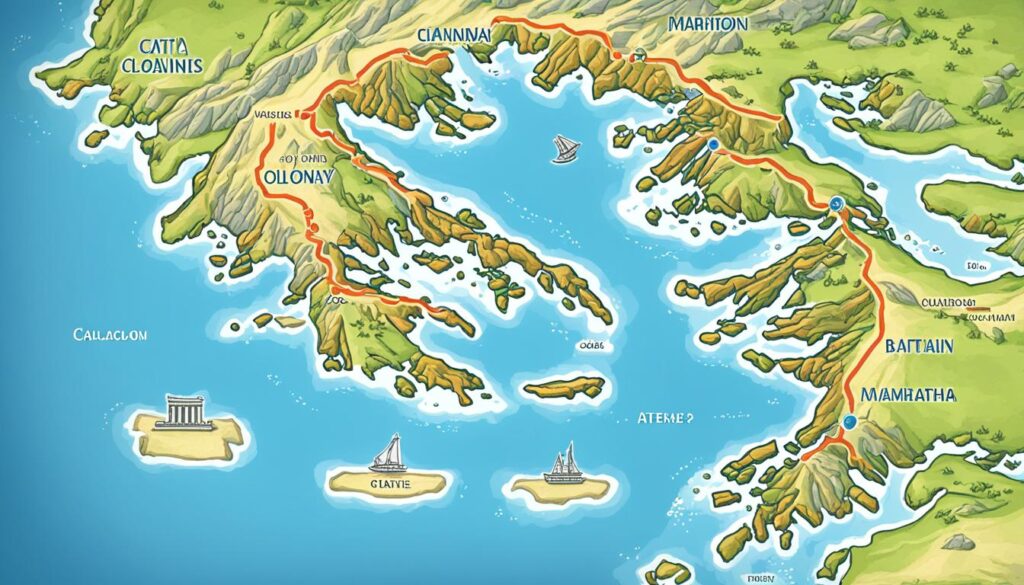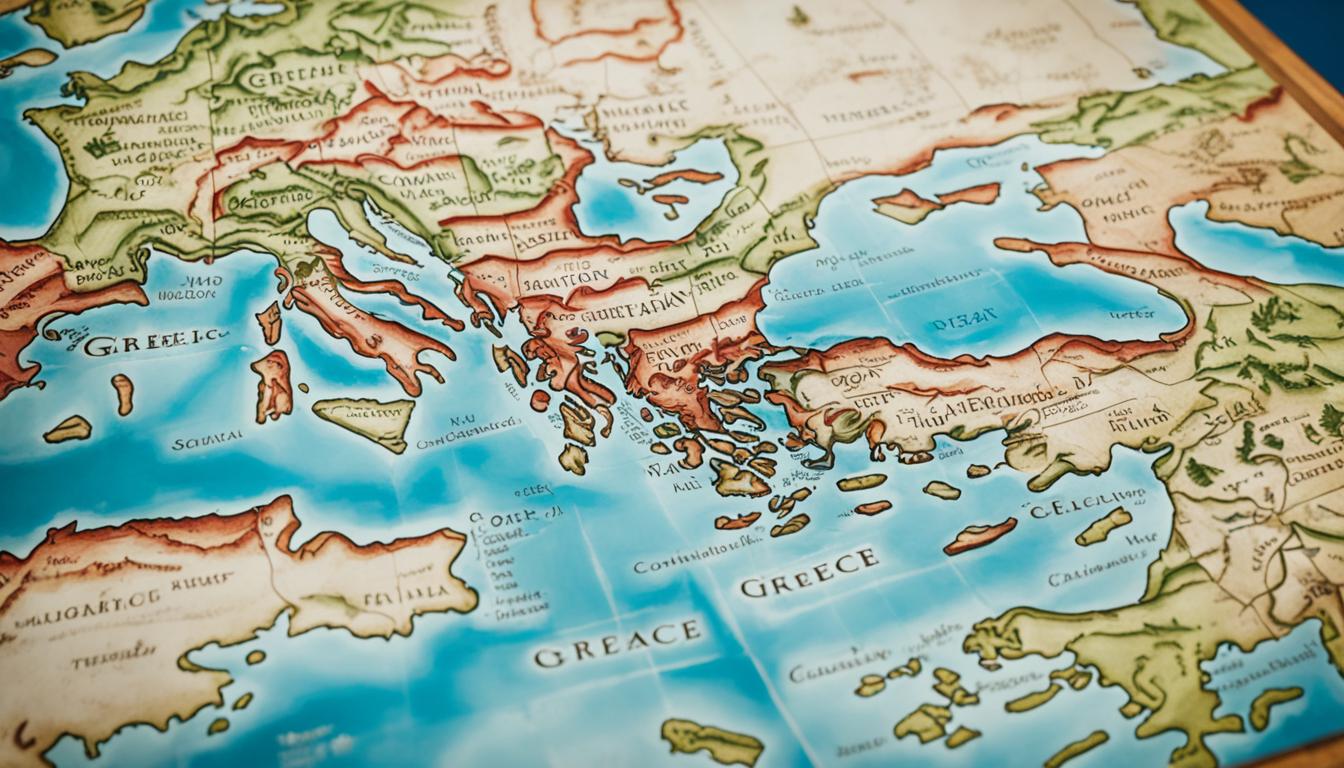Ancient Greece, known for its rich history and cultural heritage, can be truly discovered through detailed maps. These maps offer a window into the past, providing valuable insights into the geography, city-states, and famous locations of this ancient civilization.
Ancient Greece was a Mediterranean country situated in southern Europe, with the mainland surrounded by the Ionian, Aegean, and Mediterranean Seas. The unique geography, characterized by peninsulas and mountains, influenced the way ancient Greeks lived and interacted with their environment.
Key Takeaways:
- Maps of ancient Greece provide insights into the geography, city-states, and culture of this ancient civilization.
- Ancient Greece was composed of individual city-states with their own governments, laws, and customs.
- The ancient Greeks established colonies across the Mediterranean, spreading their culture and influence.
- Famous locations such as Delphi and the Acropolis in Athens played significant roles in ancient Greek history.
- Exploring ancient Greece through detailed maps deepens our understanding and appreciation for this extraordinary civilization.
The Geography of Ancient Greece
Ancient Greece was characterized by its unique geography. The mainland was a peninsula, surrounded by the Ionian, Aegean, and Mediterranean Seas. The mountains in Greece limited the amount of arable land, making farming challenging. However, the mild climate allowed for some farming, and the ancient Greeks grew crops such as barley, wheat, olives, and grapes. The rugged landscape also led to the development of a strong sense of regional identity among the city-states of ancient Greece.
The mountains of Greece played a significant role in shaping the civilization. They created natural barriers between different regions, isolating communities and prompting the development of independent city-states. Each city-state had its own government, laws, and customs, and the geography of the land influenced their political and social structures. The mountainous terrain also contributed to the city-states’ sense of self-sufficiency as they were often cut off from one another.
Impact of the Seas
The Ionian, Aegean, and Mediterranean Seas were crucial to ancient Greek civilization. They provided important transportation routes, allowing the Greeks to engage in trade and establish colonies throughout the Mediterranean region. The sea also facilitated cultural exchanges and influenced the development of maritime skills, such as shipbuilding and navigation. The ancient Greeks were skilled sailors and relied on the seas for communication, commerce, and exploration.
“The mountains and seas of ancient Greece interconnected the city-states and shaped the unique culture and identity of this ancient civilization.”
– Ancient Greece Geographic Society
| Mainland Greece | Islands |
|---|---|
|
|
| Impact on Ancient Greece | |
|
|
City-States and Colonies
Ancient Greece was a fascinating collection of individual city-states, each with its own distinct character and governance. These city-states were independent political entities, boasting their own governments, laws, and customs. Some of the most well-known city-states in ancient Greece included Athens, Sparta, and Corinth.
Additionally, the ancient Greeks expanded their influence by establishing colonies throughout the Mediterranean region. These colonies served as outposts for trade, exploration, and cultural exchange. Notable colonies were established in areas such as Italy, Asia Minor, and Egypt. Through these colonies, the ancient Greeks played a vital role in spreading their culture and influencing other civilizations.
Exploring ancient Greece’s city-states and colonies through historical cartography provides a unique perspective on the vast reach and impact of this ancient civilization.
Ancient Greek City-States
Here are some of the famous city-states of ancient Greece:
| City-State | Location |
|---|---|
| Athens | Located in Attica, in the region of modern-day Greece |
| Sparta | Situated in the southern part of the Peloponnese peninsula |
| Corinth | Located on the narrow isthmus that connects the Peloponnese with mainland Greece |
These city-states were centers of political power, cultural development, and intellectual discourse. Each had its own unique characteristics, contributing to the rich tapestry of ancient Greek civilization.
Greek Colonies in the Mediterranean
The ancient Greeks also established colonies across the Mediterranean region, extending their influence far beyond the borders of their city-states. These colonies served as trading posts, agricultural centers, and cultural hubs. Here are some notable Greek colonies:
- Syracuse (Sicily)
- Naples (Italy)
- Marseilles (France)
- Ephesus (Asia Minor)
- Alexandria (Egypt)
These colonies played a crucial role in spreading Greek culture, language, and ideas throughout the Mediterranean world. They formed connections between different civilizations, fostering trade, diplomacy, and cultural exchange.
By examining ancient maps and historical cartography, we can gain a deeper understanding of the ancient Greek city-states and their colonies, illustrating the far-reaching influence and significance of this remarkable civilization.

Famous Locations in Ancient Greece
Ancient Greece was home to many famous locations that left a lasting impact on history. One such location is Delphi, known as the “navel of the world,” where the Oracle resided and decisions were made that shaped the ancient classical world. The Acropolis in Athens was a fortified citadel sacred to the goddess Athena and renowned for its architectural and historical significance. Other notable locations include Troy, Knossos, Ephesus, and Syracuse, each with its own unique history and contributions to ancient Greek civilization.
https://www.youtube.com/watch?v=kmns88hEeJE
| Location | Description |
|---|---|
| Delphi | Located on the slopes of Mount Parnassus, Delphi was a significant religious and cultural center in ancient Greece. It was believed to be the dwelling place of Apollo and served as the site of the Pythian Games. |
| Acropolis | The Acropolis in Athens is an iconic symbol of ancient Greece. It is home to several famous structures, including the Parthenon, Erechtheion, and Propylaea. The Acropolis represents the pinnacle of ancient Greek art, architecture, and culture. |
| Troy | Troy is famous for being the setting of the Trojan War, described in Homer’s epic poem, the Iliad. The legendary city has captivated imaginations for centuries and offers insights into ancient Greek mythology and history. |
| Knossos | Located on the island of Crete, Knossos was a major city of the Minoan civilization. The ruins reveal a complex and sophisticated society that existed thousands of years ago. |
| Ephesus | Ephesus was an ancient Greek trading city in Asia Minor (present-day Turkey). It was renowned for its grand architecture, including the Library of Celsus and the Great Theater. |
| Syracuse | Syracuse was a powerful Greek city-state in Sicily. It played a crucial role in the struggle between the Greeks and Carthaginians, and its cultural and architectural heritage continues to impress visitors. |
Conclusion
Exploring ancient Greece through detailed maps allows you to unlock the rich history and cultural heritage of this remarkable civilization. By studying the unique geography of ancient Greece, shaped by peninsulas and mountains, you gain a deeper understanding of how the ancient Greeks lived and interacted with their environment. These maps offer valuable insights into the diverse city-states and colonies that flourished across the Mediterranean, showcasing the political landscape and the influence of each city-state.
Additionally, ancient Greece is dotted with famous locations that have left an indelible mark on history. From the sacred Oracle at Delphi, where pivotal decisions were made, to the majestic Acropolis in Athens, known for its architectural marvels, these sites tell stories of ancient grandeur and accomplishment. Other notable locations such as Troy, Knossos, Ephesus, and Syracuse further enhance our knowledge of the ancient Greek civilization.
Thanks to the availability of a variety of ancient Greece atlases and the vast collection of historical cartography, we can explore the wonders of this extraordinary civilization in great detail. Through the lens of ancient maps, we can reimagine the lives of the ancient Greeks, their triumphs, struggles, and enduring legacy. Delve into the world of ancient Greece and embark on a journey of discovery that will transport you to a bygone era of beauty, innovation, and intellectual brilliance.
FAQ
What is the geography of ancient Greece like?
What were the city-states and colonies of ancient Greece?
What are some famous locations in ancient Greece?
Source Links
- https://nsms6thgradesocialstudies.weebly.com/maps-of-ancient-greece.html
- https://www.thoughtco.com/maps-of-ancient-greece-4122979

